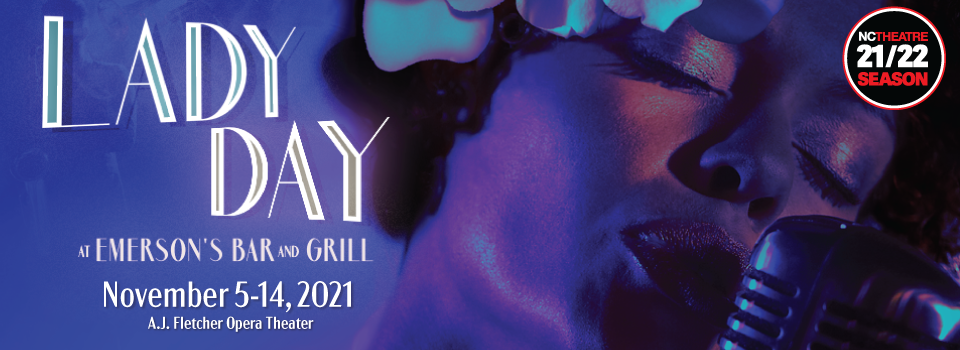NCT's "Lady Day at Emerson's Bar and Grill" is Difficult, Bold, and Absolutely Mesmerizing11/8/2021 Billie Holiday was a musician ahead of her time, a woman unafraid to do new things and to perform in a 1930s (and beyond) world that reviled her for being Black, while taking advantage of, enjoying, and profiting from her musical abilities. Sadly, “Lady Day’s” story was not an uncommon one for Black entertainers of the past or even now, but Lady Day at Emerson’s Bar and Grill, onstage now at North Carolina Theatre and under the direction of Jarvis Antonio Green, gives the artist a chance to tell her powerful story.
In the title role is the alluring Angela Robinson. Robinson fully embodies the late Holiday in looks, stature, and grace. From the moment she steps on stage in a white gown, she brings Lanie Robertson’s beautiful, sympathetic, and gutsy characterization of the artist to life. The show has Holiday giving an increasingly inebriated performance at the title bar, accompanied by her pianist Jimmy Powers (Nygel D. Robinson) and an oft-utilized decanter of whiskey. Nygel makes for an angel-faced, sweet, and sympathetic Jimmy. While his lines are few, his performance pervades. He is always watching, worrying, waiting, establishing for the audience a clear picture of his relationship with Billie. Likewise, the two background musicians, though not called upon to act, render facial expressions and subtle movements that express their feelings as Billie’s show progresses. And, as Billie’s show unravels into a deeply-sad but authentic series of monologues about her life, this one stands firm and beautiful. Unflinching in its portrayal, this tender script plays out on the NCT stage as not just a biopic, but an in-depth and discomforting character study. Green’s tense, unabashed direction forces viewers to confront the uncomfortable realities of Billie’s life and, more importantly, what they say about history and about themselves. Both complementing and countering the candid script and frank direction, Robinson infuses a vulnerability and a real, deep sadness into her performance. When Billie oh-so-casually mentions her childhood rape, for example, Robinson knows not to dig in so deep as to tip into melodrama. Instead, she delivers the news just as many a survivor would: as an unfortunate but accurate and irrevocable part of her story. Deftly-dropped bombs like this one occur again and again throughout the script, taking the close-listening viewer on an emotional rollercoaster of a journey. It is one, however, that, while difficult, is worth taking. Further reducing any propensity toward melodrama are the script’s lighter moments, such as the introduction of Billie’s dog Pepi, adorably and enthusiastically portrayed by super-pup Gershwin Coats. Even these light moments, though, are imbued with the tragedy of a life and a talent that deserved far better treatment than it received. Set with a suitably darky, smoky atmosphere, painstakingly and masterfully crafted by Romello Huins, this is far from just “another musical” about a musician. Instead, it is a powerful, important story of a marginalized group, of a marginalized person, one that bravely and boldly asks viewers to do better. -Susie Potter
0 Comments
Leave a Reply. |
TAR
We love the arts. We write about them. Founded 2018. Categories
All
Archives
January 2024
|


 RSS Feed
RSS Feed